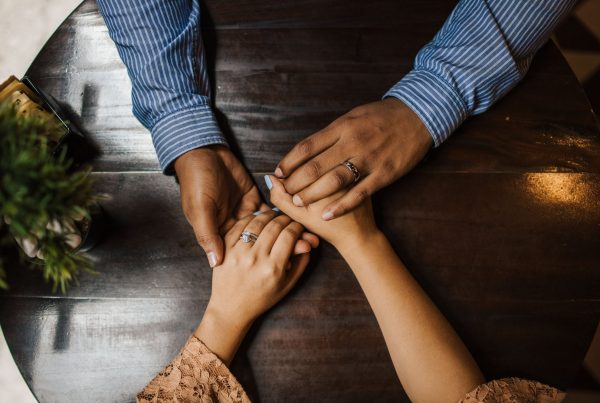Childhood sweethearts Jake and Amy* are friends of mine. They tied the knot in the presence of their closest friends and family at a beautiful garden wedding in 2014. A year later, I received news from Amy – she was pregnant! However two months after that, the bleeding started. Jake and Amy quickly went for an ultrasound to check on the baby and found there was no more heartbeat. She miscarried naturally a day or two later.
They both struggled with immense grief and Amy recalls that trying to conceive felt harder after that. She eventually got pregnant again in 2016 which felt great for awhile. But soon after giving birth to her first child, she experienced baby blues that didn’t seem to ease. They soon realized it was due to postpartum depression and anxiety. This season lasted almost a year for them, also involving a major relocation, Jake’s new job with his family business, and a second child on the way.
They say when it rains, it pours. Many couples struggle in the storm when external factors like this hit hard, especially if they allow it to hit their marriage. If there was one thing that helped Jake and Amy get through this difficult season, it would be consistently choosing to go through this together as a team, and finding practical ways to navigate the process along the way.
Knowing that their experience may help other couples, Jake and Amy said yes to publishing my conversation with them.
What were some recurring thoughts that were going through your minds during this whole difficult season?
Amy: For the miscarriage, I would often wonder what was wrong with me. My thoughts bounced between that and also questions like “why am I letting this affect me so much?” or “what if I never have a child?”
During the postpartum depression, I would constantly have thoughts like “I’m a terrible mother. I’m such a burden to my family. Will this ever end?” I often felt like I carried around a lot of guilt and I was always upset at myself for how I was responding to my circumstances.
Jake: I wondered why this was happening to us because we didn’t make any bad decisions or mistakes along the way. I kept thinking, ‘what did we do wrong and why isn’t there a solution to fix our problems quickly?’ I just didn’t want to have to deal with these problems anymore.
How did you deal with these thoughts?
Amy: Actually, what really helped was just how supportive Jake was during this time. He was there through it all. I found it very helpful whenever he would assure me and remind me that everything was going to be alright. He would listen and try to understand. He would speak truth when I was spiralling and needed to hear it. He would take on more when it came to caring for our kids when I needed a break without being resentful. He would pray with me when I felt low. It was good to feel that I wasn’t alone in the valley.
So it really helps to just have that constant support and that means both physically and verbally as well.
Amy: Yes, I think one of the things about grief or mental health issues like depression or anxiety (or even becoming a mum), is how isolating it can be. I didn’t realize it before, but looking back, I noticed how much I was processing and how lonely it felt. This is where communication becomes super important because being in a marriage means that there is someone to journey with you through everything.
I guess my issue was that I liked to be able to solve things on my own. It’s probably quite a common issue I suppose. But I’ve learnt that no man (or woman) is an island, we need help from time to time and asking for that help is both healthy and wise.

You talked about how important it was to communicate clearly with each other during this time. What exactly can that look like?
Jake: I’d say maintaining open communication means not being afraid to let the other person know what’s been happening in our day or what kind of thoughts are going on in our minds. This is very important. It’s also good to ask. Sometimes we may think we know what the other person needs and put our own call on the situation but it may not always be helpful.
Amy: Yup. For me it was about letting Jake know when I was feeling low. It was as simple as saying “Today isn’t a very good day. I’m not sure why. I feel low.” I would also tell him how he could help by giving clear requests that were also practical such as, “I may need some time to myself” or “I may need some verbal reassurance today” or “Will you be able to put the baby down for his nap?” and “Please ensure that I get up and out of the house today”. This seemed to work well for both of us. There was no more guessing and things were clear.
For anyone going through a difficult time, it can be tough to “pull your weight”. If you could narrow it down to a few (or one) practical step, what did you feel kept you both going strong together during this season?
Amy: For sure. Getting the help you need involves speaking to each other, but it could also mean speaking to a professional counsellor, a friend, or a mentor. Meanwhile, it’s important to practise being self-aware of your strengths, your limits, and your needs. For Jake and I, we also chose to pray together and trust God in the uncertainty.
Jake: It’s important to remember that the situation isn’t anyone’s fault, especially not your spouse who was carrying your child (whether it’s a miscarriage or postpartum depression). Being aware of this made me realise that it is also my responsibility to help my wife and myself to overcome this difficult period of our lives. Once we recognised this, we took all the steps and help we needed, to get through this.
That’s so true. I think for a lot of people, reaching out for help isn’t second nature and we don’t know where to start?
Jake: Yeah I understand. It can be very easy to shy away from help especially if we’re not brought up to do that or if we think that the people close to us can’t help. This may or may not be true but for Amy and I, we knew we needed to do what was necessary. It was in these times of crisis when I realised that I needed to ‘step up’ for my marriage. I just didn’t expect it to be so soon and so difficult. But us not giving up on ourselves is what made a difference.
“Hope” is the word! 🙂 So is there anything else you’d like to share with other couples who could be experiencing something similar to what you both went through?
Jake: Many life events can change a marriage for better or for worse and situations like these can make or break it. This humbles us to know that no matter who we are, we have no control over major things like sickness, life, and death. We may think we do but we really have no control whatsoever. For my wife and I, putting our trust in a God that is good and sovereign is key to how we framed what was happening and how to respond.
It’s about our perspective, or what perspective we choose to have, isn’t it?
Jake: Yup. These experiences also remind me that life is not without its challenges and difficult moments. It reminds me that there is no perfect marriage and a perfect home because we are imperfect people. But we can be resilient and strong and capable of overcoming severe moments of crisis. We just need to get some clarity, work as a team, and remember that love endures all things.
Your love for your spouse shouldn’t grow weaker in difficult situations, it should grow stronger. Don’t shy away from seeking help and doing whatever you need to do, to help you get through it. Many times we think it’s selfish or embarrassing to seek or pay for help but it’s not. Everyone needs help sometimes!
Amy: You grow through what you go through. I think marriage and motherhood (and the challenges they involve) are opportunities to learn more about ourselves, our spouses, and who we are together. You get to discover stuff about each other that you would never get to when everything is going fine and life is rosy. Be patient, empathise, and always try to see where the other person is coming from.
Also remember that you’re not meant to do marriage and family life alone. We’re all part of a larger community. Find that community. Reach out to older couples, family members, professionals, people whom you trust, and ask them for support. There’s an unexplainable joy that comes from connecting with others who can help us, if we were only willing to ask.
Remember that one day, in the future, your stories could help others too.
*Names have been changed to protect the couple’s identity.
Featured photo by John Looy on Unsplash
Photo by Jake & Amy




